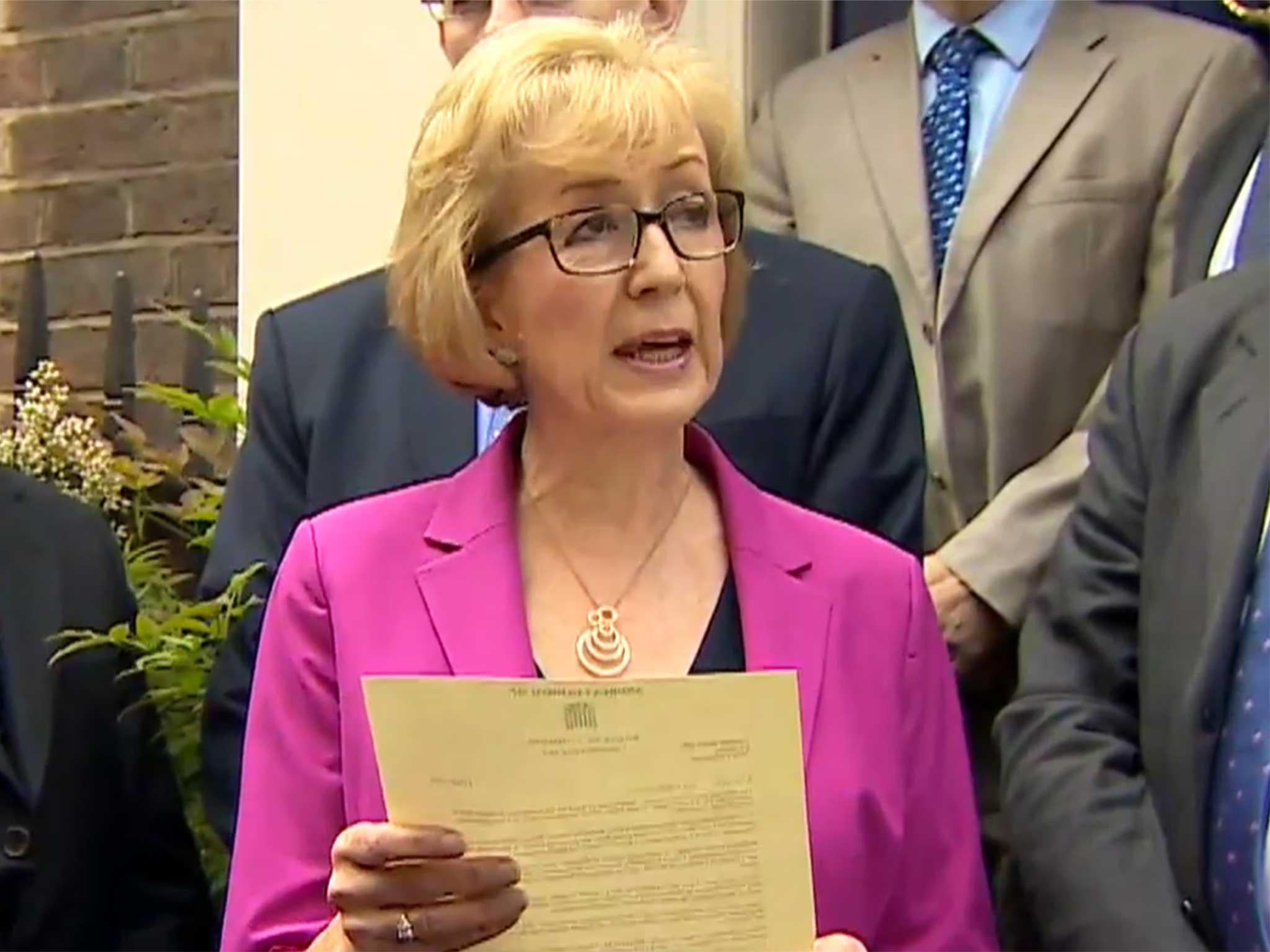Andrea Leadsom isn't a victim of the media or political elites – she only has herself to blame for her defeat
Leadsom suggested that motherhood gave her a competitive edge over her rival Theresa May in The Times. Leadsom denied, squirmed, apologised and finally decided simply to banish herself


Another day dawns, another politician bites the dust. When Boris Johnson, Nigel Farage and Andrea Leadsom campaigned to Leave, they clearly meant it rather more personally than anyone might have imagined.
The latest casualty of this peculiar epidemic of political hari-kari is a woman who few people beyond the most obsessive of Westminster watchers had heard of until a couple of months ago. Yet her meteoric rise and fall are somehow the most emblematic of the strange times in which we find ourselves.
Leadsom, with a career in finance behind her, entered parliament six years ago and picked up a junior ministerial appointment a year before the last election. Following the Conservative victory in May she was made Energy Minister. She has spoken frequently of the importance of her family and her Christian faith. Classic Conservative; seemingly classic establishment too.

Yet by hitching her horse to the Brexit wagon, she put herself in the vanguard of a movement which made much of its non-establishment credentials (putting aside Boris’s Bullingdon days and Gove’s apparent chumminess with the PM and Chancellor). The Leave campaign ignored the views of ‘experts’ (pah!), the majority of MPs (shame!), the agenda of the liberal intelligentsia (pooh!) – and didn’t worry a great deal about facts (sell refugees, fund the NHS!).
And when the first ramifications of the shock referendum result were over, the minister of state for energy, who had shone so brightly during those TV debates, was suddenly thrust centre stage. She would bring her “fresh leadership” and non-establishment credentials to a renewed Tory party. Her new broom would sweep so vigorously that pessimism would be “banished”.
Then came her ill-fated interview with The Times, in which she suggested that motherhood gave her a genuine stake in the future of the country – compared to her rival Theresa May, who could not have children. Social media went into meltdown; Leadsom denied, squirmed, apologised and finally decided simply to banish herself. It was quite a ride.
But as Theresa May prepares to take the easiest path ever into Number 10, it is clear that Mrs Leadsom’s supporters continue to believe that it is the media (worse, the mainstream media, AKA the ‘MSM’, AKA the establishment again) that has done for their woman. One supporter told The Independent that “media vitriol” was to blame; Louise Mensch accused The Times of “simple misreporting”. Mrs Leadsom herself apologised to Theresa May for “any hurt I have caused” (ironically using a construction once beloved of weasly newspapers), then paradoxically declared that actually the article “said completely the opposite of what I said and believe”.
This is nonsense. The transcript – and especially the audio – of the relevant part of the interview make it plain that Mrs Leadsom drew a comparison between herself and Mrs May around the subject of motherhood. It may have been unintentional; she may have simply been naïve. But to contend that The Times’ report said “completely the opposite” of the words she uttered is unsustainable. Yes, its headline - “Being a mother gives me edge on May – Leadsom” - was the paper’s interpretation of her comments, but it was not presented as a direct quote, and frankly seems eminently reasonable.
Yet the victim status claimed by Mrs Leadsom and her fans cannot be seen in isolation. It is a continuation of the narrative which has fuelled Ukip, the Leave campaign and all manner of conspiracy theorists. It is part and parcel of the anti-élite, anti-establishment groundswell which pays regard to volume over content, simplicity over nuance, slogans over truth. Nigel Farage showed how effectively a populist politician can tap into these feelings if they proclaim they are giving a voice to those whose concerns have been ignored – notwithstanding whether those concerns have any foundation in reality or whether proposed solutions are economically or morally tenable.
Theresa May has a lot on her hands. But above everything she needs urgently to address the cynicism which seems so rampant in Britain just now. Because as things stand, truth is becoming the beggar of belief.
Join our commenting forum
Join thought-provoking conversations, follow other Independent readers and see their replies
Comments
Bookmark popover
Removed from bookmarks